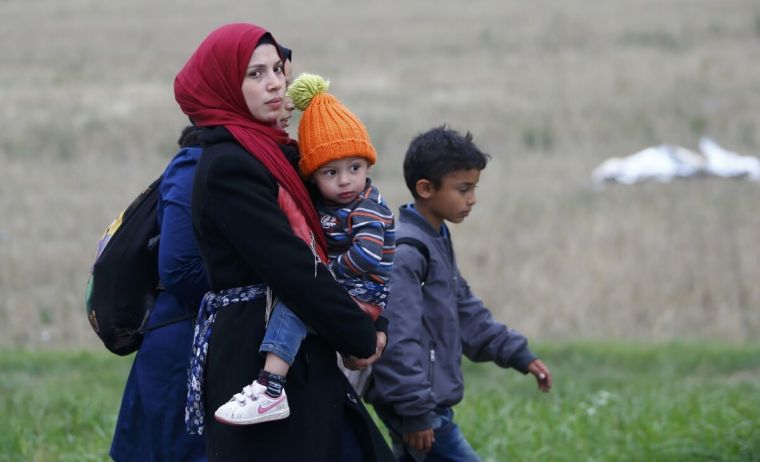Hungary PM slams migrant 'rebellion', UN warns of millions more refugees

Hungary's prime minister angrily accused illegal migrants on Friday of "rebelling" against the rule of law in his country as security forces across Europe struggled to control record flows of hungry, scared refugees.
The United Nations called for the swift creation of large-scale reception centers in frontline states such as Hungary and Greece, and one UN agency warned that millions more refugees could arrive in Europe if Syria's civil war continues to rage.
Many of the tens of thousands of refugees now trekking from Greece via the Balkans and Hungary towards western Europe are fleeing the Syrian war in search of sanctuary, above all in more welcoming and generous countries such as Germany and Sweden.
German Foreign Minister Frank-Walter Steinmeier said his country, which expects to take in 800,000 asylum seekers this year alone, had finite resources and urged other European countries to do much more to share the burden.
He said Germany expected to receive another 40,000 migrants this weekend. And as politicians from the left and right accused Chancellor Angela Merkel's government of losing control of the refugee situation, the defence ministry put 4,000 troops on standby to help with the influx.
Citing security concerns, Austria partially shut a highway linking Vienna and Hungary on Friday. Some 8,000 people had crossed the border on Thursday and a further 4,500 arrived overnight, Austrian police said. The rail link to Hungary also remains shut due to "massive overburdening" by the migrants.
Hungary is racing to construct a fence along its border with Serbia by early October to help stem the tide. It also plans to implement much tougher immigration rules from next week.
Prime Minister Viktor Orban, a fiery populist who has framed the crisis as a battle to preserve Europe's prosperity and "Christian identity", angrily criticised the behavior of the mostly Muslim migrants who have been filling up central Budapest and disrupting traffic along roads running westward to Austria.
"They seized railway stations, rejected giving fingerprints, failed to cooperate and are unwilling to go to places where they would get food, water, accommodation and medical care...They rebelled against Hungarian legal order," Orban told reporters.
"From the 15th, Hungarian authorities will not forgive illegal border crossings," he said.
More than 170,000 migrants have crossed into Hungary from non-EU Serbia so far this year. Many try to avoid being registered in Hungary for fear of being stranded there or returned to the country later in their journey across Europe.
Millions more could come
In Geneva, the UN High Commissioner for Refugees (UNHCR) said it was sending pre-fabricated housing units to provide temporary overnight shelter for 300 families in Hungary but also expressed concern over Budapest's tough approach, including the possible deployment of troops to tackle the crisis.
"Obviously we expect authorities to respect rights of refugees whether they are the police or army," said UNHCR spokesman William Spindler.
Syria's four-year civil war has so far displaced almost eight million people, said Peter Salama of UNICEF, the UN childrens' agency, adding: "There could be millions and millions more refugees leaving Syria and ultimately (going) to the European Union and beyond."
So far this year, a record 433,000 refugees and migrants have crossed the Mediterranean to Europe, more than double the total for all of 2014, the International Organization for Migration (IOM) said on Friday.
The European Commission, backed by Germany and France, wants EU member states to accept mandatory quotas to share out some 160,000 refugees but the plan faces stiff resistance in some capitals. On Friday the UNHCR said the number of people requiring relocation had now risen to 200,000.
Speaking in Prague, Steinmeier said the EU needed a "fair mechanism of redistribution of migrants (still coming)".
"This challenge cannot be borne by one country. We have to invoke European solidarity," he told a joint news conference with the foreign ministers of the Czech Republic, Slovakia, Hungary and Poland – countries opposed to the EU's proposal for mandatory quotas.
Germany has come under fire from Orban and other east European leaders for opening its door to Syrian asylum seekers, saying such generosity will only encourage many more to come.
Denmark, which like Britain has opted out of EU rules on justice and home affairs, said on Friday it would not take part in the Commission's relocation scheme.
Earlier this week, Denmark shut off some traffic with Germany to curb refugees trying to reach Sweden, which remains much more welcoming than other Scandinavian countries, but later allowed them to travel through.
Finland said it would accept its two per cent share of asylum seekers under the Commission plan but said it remained opposed to mandatory quotas and would cut benefits for refugees.
EU interior ministers are due to discuss the Commission proposals on Monday. If they fail to reach a deal on tackling the crisis, European Council chief Donald Tusk said on Friday he would call an extraordinary summit of EU leaders this month.











